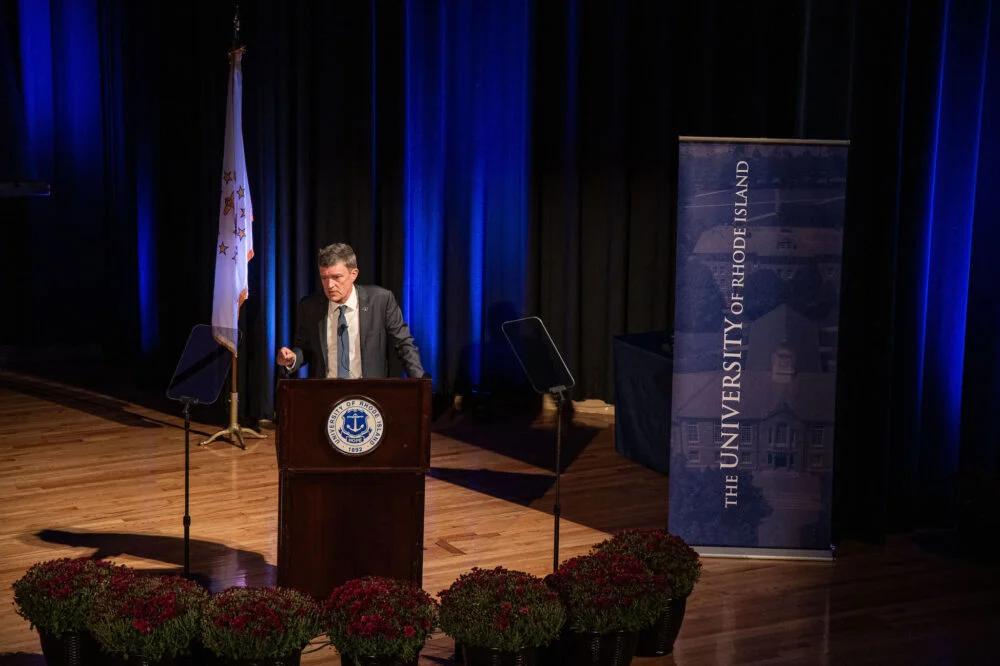President of the University of Rhode Island Marc Parlange gave the State of the University of Address on Tuesday, Oct. 10, in the Edwards Auditorium.
Parlange presented URI’s 10-year strategic plan, titled Focus URI, which was announced in the spring.
Before Parlange began, he spoke on the URI Indigenous land acknowledgement. He also mentioned the current Israel-Hamas war.
“We stand in support of those in our URI family who are affected by the horrific attacks in Israel,” Parlange said.
In his address, Parlange spoke on URI’s improvements in the past year, and plans to build on that success.
According to Parlange, URI was granted a $171.2 million fiscal budget from Rhode Island State Governor Daniel McKee.
$105.4 million will go towards operating expenses and $65.8 million will go towards improving athletic facilities, according to Parlange.
This is an increased investment in operating expenses from the state of 16%. Parlange said that after 50 years of decline, URI’s investment has risen.
“I am really proud to say that we are starting to turn the corner,” Parlange said. “We have shifted our course and we are on a new path.”
He highlighted URI’s Day of Giving, which took place on Oct. 5. The University raised over $2 million, exceeding the $1.5 million goal.
There are four priorities categorized to the 10-year strategic plan. These priorities are to broaden impact, enhance student achievement, foster an inclusive culture and to power the University of the future.
Parlange presented the first priority, broadening impact, mentioning URI’s flagship research and initiatives as a land and sea grant university.
He highlighted assistant professor Katarina Quinlan, who has done research on therapy methods for spastic cerebral palsey.
Parlange praised assistant professor of sustainable agriculture/food systems Patrick Baur and his work in organic food safety. Baur has received millions of dollars in awards for his research from the United States Department of Agriculture, according to Parlange.
“We are becoming a destination for companies and organizations who want to work with us,” Parlange said.
Parlange highlighted the URI-led Watershed Watch Project. This is a water monitoring program with over 400 volunteers that test waterways in Rhode Island, improving plans for water safety.
The Community First Responder program, directed by college of pharmacy clinical professor Anita Jacobson, has given thousands of naloxone kits to Rhode Island residents over the past three years, according to Parlange.
“URI is literally saving lives,” Parlange said.
Another priority of Focus URI is to enhance students’ achievement. Parlange emphasized the importance of hands-on learning, improved courses and strong academic and financial support for students.
Parlange highlighted the international engineering program that combines engineering with world languages and global internship opportunities. This program can equip students to lead in the global sector of engineering, according to Parlange.
He also spoke of the Immersion in Juvenile Social and Legal Justice (SOC 303) Sociology course. Students experience working with caseworkers and family court judges to get hands-on experience, according to Parlange.
Currently, more than 90% of students receive financial assistance from URI, according to Parlange. Parlange said 30% of this year’s incoming students were the first to attend college in their family.
To improve athletics, the University plans to renovate Meade stadium, build running tracks and enhance Tootell pool.
The third priority of the strategic plan is to foster inclusivity.
“A university is all about people and culture,” Parlange said. “We are a vibrant, integrated university that celebrates people with a culture of excellence and giving back.”
Parlange praised entities that have the goal of creating inclusivity around campus. These groups include the Gender and Sexuality Center, the Women’s Center, Center for Military and Veteran Education and the Multicultural Student Services Center.
According to Parlange, URI will work with the Office of Disability, Access, and Inclusion to exceed standards for accessibility and create a welcoming environment.
The last priority of Focus URI, according to Parlange, is to power the University of the future.
“We are modernizing our financial practices with a focus on generating new revenue that will be reinvested in our teaching research and service missions in ways that broaden our reach and intensify our impact,” Parlange said.
Parlange said URI’s investments provide funding that will help new programs bloom in order to improve academic research.
$3 million has gone towards 29 unique programs initiated by the URI community, according to Parlange. He said the purpose is to support wider ranges of administrative areas, increase enrollment and to improve financial aid.
This priority will also focus on sustainability by cutting down single-use plastic water bottle usage across campus.
“We have set ambitious goals and it will require our collective effort to reach them,” Parlange said. “We have great momentum at URI and our time is now.”
Parlange expressed confidence in future improvements at URI, as well as the importance of investments to do so. The University has adopted a new incentive-based budget model, according to Parlange.
The budget-model, according to Parlange, will fulfill flagship initiatives, incentivise operating agencies, diversify streams of revenue and become more cost efficient.
“Without investment, public institutions like URI risk losing their ability to deliver on their vital education, research and service missions,” Parlange said.
Focus URI and the new budget model will work to improve URI’s overarching functionality and ranking in comparison to other university peers, according to Parlange.

